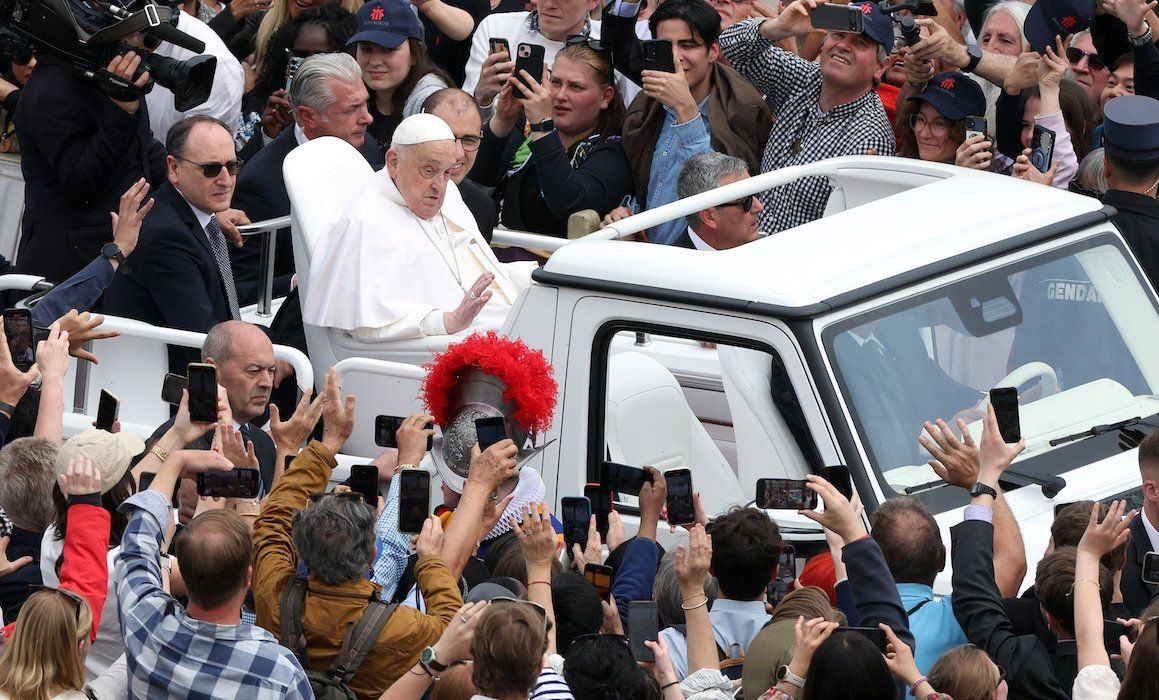Pope Francis, the 266th pontiff of the Roman Catholic Church, was born Jorge Mario Bergoglio on Dec. 17, 1936, in Buenos Aires, Argentina. He died Monday morning at his residence in the Vatican’s Casa Santa Marta at age 88.
The sad news, which was announced just before 10 a.m. local time, comes just one day after the pontiff – who had been recovering from a severe bout of pneumonia and a prolonged hospital stay – appeared on the balcony of St. Peter’s Basilica on Easter Sunday and offered the “Urbi et Orbi” blessing to the “City [of Rome] and to the World,” with an aide reading the address. He then took to his popemobile and greeted crowds in St. Peter’s Square for the first time since his hospitalization – and now his final public appearance.
Known as the “people’s pope,” Francis’ papacy was defined by his longstanding commitment to social justice. It was the fruit of personal experience: Francis, the son of Italian immigrants, worked as a janitor, nightclub bouncer, chemical technician, and literature teacher before pursuing the priesthood. His common touch and compassion for the less fortunate were hallmarks of his religious career and represented a departure from the more conservative style of his predecessors, John Paul II and Benedict XVI.
Bergoglio entered the Society of Jesus in 1958 and was ordained as a priest in 1969. Lauded for his work with the poorest parishes in Buenos Aires, he was named the city’s archbishop in 1998 before being elevated to cardinal in 2001. In March 2013, Bergoglio made history as the first Jesuit and first Latin American to ascend to the papacy, choosing the name Francis in honor of Saint Francis of Assisi, patron saint of nature and the poor.
As pope, Francis maintained his humble approach, choosing not to wear the papacy’s traditional elaborate vestments. He transformed a Vatican plaza into a “palace for the poor” for the homeless, whom he called the “nobles of the street.” He worked to make the church more inclusive, awarding key roles to women and LGBTQ+ individuals, and even inviting transgender individuals to the Vatican. He championed sustainable development and the fight against climate change, publishing the 2015 encyclical “Laudato si',” which called on humanity to care for our “common home.”
Francis also advocated for the rights of migrants, proclaiming in 2024 that “turning away migrants is a grave sin.” In recent months, he has publicly rebuked US Vice President JD Vance’s characterization of “ordo amoris,” the Catholic Church’s “order of love,” as a justification for President Donald Trump’s deportation policies, but he notably met briefly with Vance on Sunday to share Easter greetings. Francis penned a letter to the bishops of America in which he said “The true ordo amoris that must be promoted is that which we discover by meditating constantly on the parable of the ‘Good Samaritan,’ that is, by meditating on the love that builds a fraternity open to all, without exception.”
Francis’ stances also put him at odds with conservative elements inside the Church. One of his most controversial moves was reversing a decision by Benedict XVI that prioritized the Latin celebration of Mass. It highlighted a division brewing since the 1960s over whether Mass should be translated into local languages, which conservatives feared could dilute the Church’s traditional messaging. And while Francis appointed more cardinals from the Global South than any other pope, not all shared his progressive views: In 2023, a number of African bishops publicly criticized his blessings of individuals in LGBTQ+ unions.
In many ways, Francis was a pope of his time – and that time, like his life, has now ended, extinguishing a progressive light in the world. Vatican officials will now begin paying their final respects to the pope in the Santa Marta chapel, followed by the general public, before Francis is laid to rest and a conclave is held to elect his successor.
